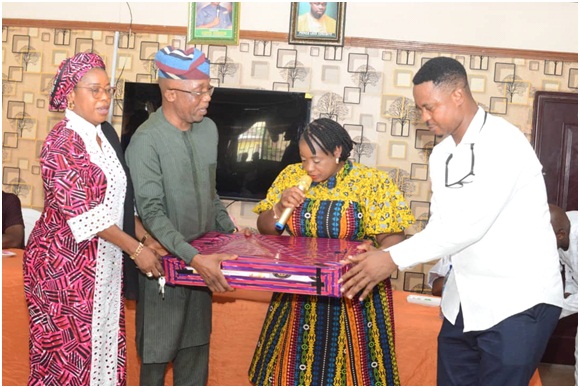Blame not our overripe plantains
By Busuyi Mekusi
|
Natural things parade excellent glamour that nonetheless wanes as they age, leading often, ultimately, to death. The death in this case may be physical or metaphorical. Either way, once roundly-built beautiful faces get wrinkled; strong legs go feeble; standing pointing or punching breasts become flattened; lions formerly voraciously vicious become weakened; phoenix embarks on incineration, etc., to complete cycles that are imperative of mortality. Curiously enough, the consequential end of this established trajectory would have been preceded by lofty stages, culminating in a prime.
By inference, the old women that now care less about their physical appearance were once engrossed in personal adornment and self glorification, while men whose eclectic agility is now less important could be lions in the jungle and merciless ‘diggers’ in bed. Similarly, ladies that are presently sold to queer postmodern styles and boys revolting by wearing rings in their ears and noses, dwarfed by weird dreadlocks, with sagged panties showing off inner wears would someday pant to climb little heights, and need auxiliary modes for mobility. It is jocularly opined that things in nature and the environment lose steams, debilitated by time. You and I are vulnerable too!
The commitment of Yoruba people to underpin their experiences with phenomena precedent on their conditions could not be easily ignored by watchers, including myself. It is for this reason that the philosophical application of the metamorphosis of the plantain for proverbial communications is the raison d’être for this engagement. To negate the good opinion someone holds about a bad situation, the Yoruba would quip that: the plantain is decaying while you believe it is ripening (Ògèdè ń bàjé, e ló ń pón).
Plantain fruits are the result of a blossoming plantain trunk, and could be prepared for eating, using different forms. The freshly boiled plantain is rich in iron, and the consumption is believed to enhance body-built and, among others, help genital erection in men. This unripe variant could be jerked, sundry and made into powder for delicious Amala delicacy. The fresh and freshly boiled ones could also be blended using electronic devices that have removed ‘quarrelling mortars and pestles’ from Nigerian houses that are badly constructed. It is saying the obvious that lack of storage facilities and off-taking for industrial usage are some of the reasons for lack of industries and pervasiveness of perishable agricultural products in Nigeria, also ending up as disincentive to farmers.
In another vein, plantains could be left to ripe, with the new condition making it possible for it to be consumed as dodo (fried plantain) or used for porridge, just like the unripe one, as well. This tastily delicious brand has also provided an opportunity for the Yoruba to coin another proverb around dodo, typifying benefits and truth-saying, to the effect that anyone who eats dòdò (fried ripe plantain), would not be able to say the truth (Eníbá je dòdò, kòle so òdodo). Apart from the contextual meaning, the punning of dodo (fried plantain) and òdodo helps in enhancing the linguistic quality of the proverb, laced with the coherence between the tonal notation and marking as well as dodo, as a word. As good as the ripening plantain may be, the first proverb about a bad situation conceived as reasonably good is used to remind us that a ripening plantain is on its way to decaying or being thrown away, and could only be used for another brand of local staple called dòdò-Ikire when overripe. This is because an overripe plantain, according to Wiktionary, is excessively ripe, spoiled and gone bad.
Thomas Wyatt’s “Blame Not My Lute” is a poem meant to excuse a writer from excoriating criticism, for choosing to take on certain individuals in his artistic works. The lute stands for the pen and poetic license of the artist through which the society and people are mirrored. The lutes of Soyinka and Adichie, the past days, tended to be blameable as the former abrasively configured the Obedients (principally youths supporting the LP candidate, Peter Obi), while the latter wrote a letter to the America President on the need not to accept Tinubu as the winner of the 2023 presidential election. The actions of the two have attracted condemnations from opposing sides, with some youths calling Soyinka out, while the social media space have been awash with the video of a lady that claims that Adichie plagiarised her work in writing Half of a Yellow Sun. As characteristic of the ethnic sensibilities of Nigerians, efforts have also been made to rekindle the artistic rivalry that exists between Soyinka and Achebe, in relation to the Nobel Prize for literature won by Soyinka.
Nigerian youths are constantly blamed for lacking in moral character needed for social-political engagements, particularly the generation of Soyinka that he himself described as the ‘wasted generation’. Soyinka’s had explained that lack of opportunities and bad leaderships impaired the attainment of the full potential of people in his generation. It is, however, a misnomer as late M. K. O. Abiola canvassed the notion of not the wasted generation, even though he ended up falling into the contradictions of bad leadership. Wastages in human endeavours are similarly vividly narrated in Owen Johnson’s book, The Wasted Generation, which is a memoir about World War I. The idea of the wasted generation would pass more for contemporary youths that have been denied necessary acceptable socialisation, short-changed in qualitative education, starved of employment, and made vulnerable to hawks in terrorists and kidnappers. The moral recession of youths is best blamed on judgemental adults who are apparently wasters in all ramifications.
No doubt, the overripe plantains in the youths are a manifest part of the older generation, based on the principle of genetic reproduction and evolutionary civilisation. The older generation sentencing the youths to incineration had produced the best from and in them, and they must either embark on the processes of reversing the negative order, or simply learn to live with it. These ‘lost youths’ portend a shaky future, and simply illustrate the idea of the dying embers leaving behind ashes, noting the value of ashes as a regenerative element. The older generation should stop blaming the raging youths, as they remain biosocial vestiges of their toxic behaviours, coming out evidently of the repressed aspects of humans.
Some recent killings in Nigeria suggested an aborted future, or a tomorrow that was lost yesterday. A suspected ‘Yahoo Yahoo’ boy was reported stoned to death at the Ijoka area of Akure, Ondo State, for allegedly killing two people, as a result of reckless driving, while a student in Awolowo Hall of Obafemi Awolowo University, Ile-Ife, Osun Sate, was beaten to death for allegedly stealing a phone. What a shame in Awolowo’s corridor! A student of Adekunle Ajasin University, Akungba-Akoko was also allegedly stabbed to death by an indigene over 1,000 naira. As the youths face existential challenges from their ranks, the Nigeria pretentiously religious societies are breeding homosexuals, yet living in denials.
The prevalence of jungle justice in Nigeria would predispose it to psycho-social interrogations. From 2019, reports had it that there have been 279 cases of mob attacks in Nigeria, leading to 391 deaths. These heinous crimes are reflective of social disconnect, as well as lack of respect for human life and dignity. It is also evident of psychical battering, accumulated negative emotions, and venting of bottled-up frustrations at the slightest provocation. It is also reminiscent of lack of trust by the people about the capacity of government institutions and agencies to sanction offenders, ensure justice for victims and secure compensations, if need be. The Nigerian space is indeed toxically violent!
Therefore, the overripe plantain ‘wasted generation’ are not to blame but poor parenting, bad mentoring, corruptive tendencies, material greed, societal complacency, bad economy, inept government agencies, as exemplified by the police who would ban the use of artificially tainted vehicle and simply extort culprits rather than reprimand them, thereby breeding criminals that are always on the prowl. Notwithstanding religious posturing, Nigerians are very vengeful, poised always to take their pound of flesh, and quick to recede to the Mosaic notion of an-eye-for-an-eye.
Arguably, there is the urgent need to freeze the ongoing negative decaying of our overripe plantains. This is as the redemption of overripe plantains is best attained through frying. We must be intentional about re-socialising the youths, based on recovered abandoned African nuances that would not, nonetheless, violate their fundamental human rights. There is the need for responsive government and good governance. Government institutions must be noticeably effective, to prevent people from resorting to self help. This is as annihilating tendencies across all divides are mitigated. There should be economic and attitudinal accountability, based on life-style auditing and sanctioning.
We do not need a soothsayer to predict that the Odewale or Oedipus in our youths could end up killing their fathers, and marrying their mothers, if urgent steps are not taken to arrest their frightening overripe plantains!










